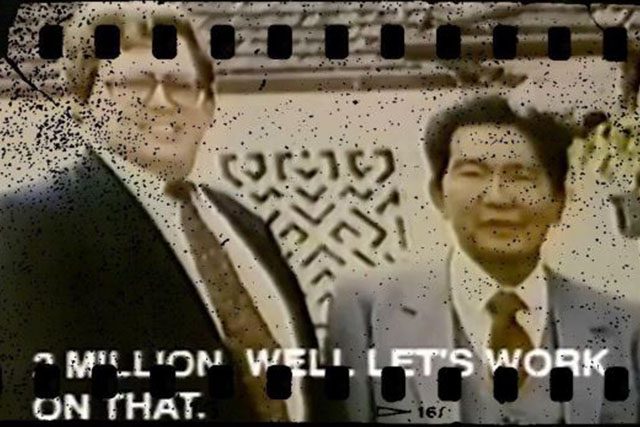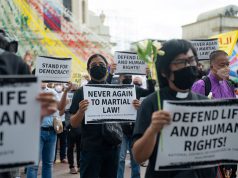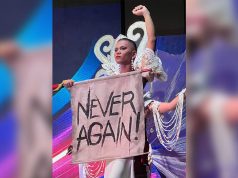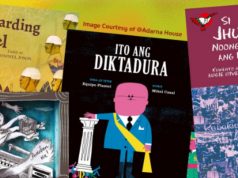
Filipinos were urged to watch documentaries that shed light on the darkest period of contemporary Philippine history as the nation remembers late president Ferdinand Marcos Sr.‘s declaration of Martial Law 48 years ago.
Free documentaries about Martial Law and its aftermath is currently streaming at Daang Dokyu‘s website up to Monday midnight which includes ABS-CBN’s documentary, “Marcos: A Malignant Spirit.”
Others are Ramona Diaz‘s “Imelda,” Kiri Dalena‘s “Alunsina,” Nettie Wild‘s “A Rustling of Leaves: Inside the Philippine Revolution” and Lito Tiongson’s “Mendiola Massacre.”
The Martial Law-themed documentaries, according to the festival organizers, is for Filipinos “not just to remember the past” but to also serve as “a statement of the future.”
“Our generation now has been witnessing the erosion of our freedoms, unbelievable abuses of power, and a growing confusion about the future,” Jewel Maranan, one of the festival organizers, was quoted as saying.
“We think documentaries can help make up our minds about the lessons already learned, mistakes we shouldn’t repeat, and what we shouldn’t allow again to be done to us as a people,” she added.
“Marcos: A Malignant Spirit” is a 1986 documentary hosted by Angelo Castro Jr. which contains rare footage and recorded conversations looking into “the inhumane manner in which Marcos and his henchmen systematically drained the economy.”
“Imelda” offers an intimate glimpse of Marcos’ widow, former first lady Imelda Marcos and her “obsession with power” as she rises from being a beauty queen to being the “Iron Butterfly” of the Philippines.
“A Rustling of Leaves: Inside the Philippine Revolution,” meanwhile, is a documentary by an acclaimed Canadian filmmaker that tackles revolutionaries and leftists after the Martial Law era.
“Mendiola Massacre” is a newsreel of the massacre that happened in the Mendiola Bridge in Manila were farmers and civilians died in a protest action for genuine agrarian reform on January 22, 1987.
“Alunsina” is a documentation of the struggles of children and families in an urban settlement severely affected by the current administration’s War on Drugs campaign.
The documentaries are part of the film festival’s opening week from September 19-21, 2020. The festival will be up to November 5, 2020.
Daang Dokyu celebrates the hundred years since the country had started to capture in film stories about Filipinos. It features documentaries from politics to culture and the arts.
In view of this, Filipinos urged their citizens to stream the documentaries as the country observes the 48th year of Marcos’ declaration of Martial Law.
A Twitter user claiming to be half-Filipino and half-Persian shared some screenshots of ABS-CBN’s documentary along with the hashtags “#NeverForget” and “#NeverAgain.”
Marcos: A Malignant Spirit (1986) features excerpts from depositions of the Marcoses, audio recordings & US congressional hearings on how this despotic family established their legacy of plunder. #NeverForget #NeverAgain
Watch it via @DaangDokyu Link: https://t.co/65DU268ODj pic.twitter.com/ZIQPzir9Ru— Fudge Tajar (@fudgetajar) September 20, 2020
Another Twitter user discouraged Filipinos from visiting Manila Bay to have a glimpse of the artificial white sands by DENR and urged them to watch the documentaries about Martial Law instead.
“Anyway, imbes na magpunta kayo sa ‘beach,’ nood na lang kayo dito. https://daangdokyu.com/watchnow/ No face mask/face shield required,” the online user wrote with a retweet of a news outlet’s infographic about the period.
“If you wanna watch some docu films about Martial Law, these films are still available until tonight 11:59 p.m. Support Daang Dokyu Festival. They are screening 5 martial law docu films. Let’s educate ourselves mga kapitbahay!” exclaimed another Filipino.
Significance of September 21
Sept. 21, 1972 is the date that Marcos placed the Philippines under Martial Law under Proclamation No. 1081 in a supposed bid to fight communist rebellion and allegedly restore order.
The period, which lasted for 14 years, saw the curtailment of civil liberties, extrajudicial killings and unsolved disappearances, media oppression and economic recession, among others.
RELATED: 31 YEARS OF AMNESIA: STORIES ON THE MYTHS THAT MADE MARCOS
London-based human rights organization Amnesty International said that “some 70,000 people were imprisoned and 34,000 were tortured; over 3,200 people were killed” from 1972 to 1981, during the years that Martial Law was imposed.
The period resulted in an “era of impunity” where activists, human rights defenders and mere civilians were arrested with the suspension of the writ of habeas corpus by emboldened uniformed personnel.
It also saw the nation mired with debt, which happened in part due to “a pattern of chronic borrowing, devaluation of the peso which bloated prices of goods, and reckless spending” of the regime.
“Income distribution also worsened during Martial Law, with the poorest segment of society seeing a decline in their share of the total income between 1971 and 1979. The richest 10 percent, on the other hand, enjoyed a much larger piece of the pie,” Philstar’s NewsLab reported.









